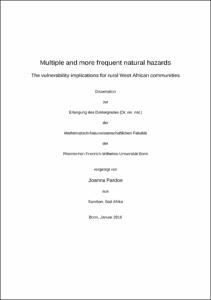Multiple and more frequent natural hazardsThe vulnerability implications for rural West African communities

Multiple and more frequent natural hazards
The vulnerability implications for rural West African communities

| dc.contributor.advisor | Birkmann, Jörn | |
| dc.contributor.author | Pardoe, Joanna | |
| dc.date.accessioned | 2020-04-22T23:38:54Z | |
| dc.date.available | 2020-04-22T23:38:54Z | |
| dc.date.issued | 22.12.2016 | |
| dc.identifier.uri | https://hdl.handle.net/20.500.11811/6906 | |
| dc.description.abstract | Rural, subsistence agriculture dependent communities in the West-Sudanian Savannah climate zone are dependent on a single rainy season to produce the crops that they need to sustain themselves for the following year. However, increasing variability in rainfall presents these communities with a considerable challenge, a challenge that is likely to worsen with climate change. Seasonal variability is manifest as local level floods and dry spell droughts. These events disrupt crop growth and impact on other aspects of life such as housing and access to water. Climate change is expected to not only increase the frequency of these events but to also increase the likelihood of floods and droughts occurring in succession, in the same rainy season. Responding to gaps in the application of social vulnerability concepts to multiple hazard scenarios, this research provides an approach to account for the differential impacts and responses towards multiple and more frequent hazard events. The research presents important insights for a future under climate change, particularly highlighting the potentially different outcomes of more frequent hazards compared to multiple (successional) hazard events where the impacts are deeper. Connecting with concepts relating to social-ecological systems and social vulnerability, the research demonstrates how thresholds of change vary based on the nature of hazard events. It finds that more frequent hazard events result in gradual erosions of assets and coping capacity that can lead to rigidity traps. In contrast, the deeper losses incurred by multiple (successional) hazard events is more likely to spark social change, however, these changes are limited by inadequate adaptation options. The findings from this research have been generated through predominantly qualitative analysis and the application of relatively innovative methods, including a participatory game and scenarios. The focus on three case study communities in different West African countries, provides a basis for generating broader conclusions that argue for a concerted effort to address barriers to adaptation and to enhance support for affected communities. | |
| dc.language.iso | eng | |
| dc.rights | In Copyright | |
| dc.rights.uri | http://rightsstatements.org/vocab/InC/1.0/ | |
| dc.subject | vulnerability | |
| dc.subject | natural hazards | |
| dc.subject | floods | |
| dc.subject | droughts | |
| dc.subject | adaptation | |
| dc.subject | climate change | |
| dc.subject.ddc | 550 Geowissenschaften | |
| dc.subject.ddc | 910 Geografie, Reisen | |
| dc.title | Multiple and more frequent natural hazards | |
| dc.title.alternative | The vulnerability implications for rural West African communities | |
| dc.type | Dissertation oder Habilitation | |
| dc.publisher.name | Universitäts- und Landesbibliothek Bonn | |
| dc.publisher.location | Bonn | |
| dc.rights.accessRights | openAccess | |
| dc.identifier.urn | https://nbn-resolving.org/urn:nbn:de:hbz:5n-45050 | |
| ulbbn.pubtype | Erstveröffentlichung | |
| ulbbnediss.affiliation.name | Rheinische Friedrich-Wilhelms-Universität Bonn | |
| ulbbnediss.affiliation.location | Bonn | |
| ulbbnediss.thesis.level | Dissertation | |
| ulbbnediss.dissID | 4505 | |
| ulbbnediss.date.accepted | 09.08.2016 | |
| ulbbnediss.institute | Mathematisch-Naturwissenschaftliche Fakultät : Fachgruppe Erdwissenschaften / Geographisches Institut | |
| ulbbnediss.fakultaet | Mathematisch-Naturwissenschaftliche Fakultät | |
| dc.contributor.coReferee | Evers, Mariele |
Files in this item
This item appears in the following Collection(s)
-
E-Dissertationen (4116)




